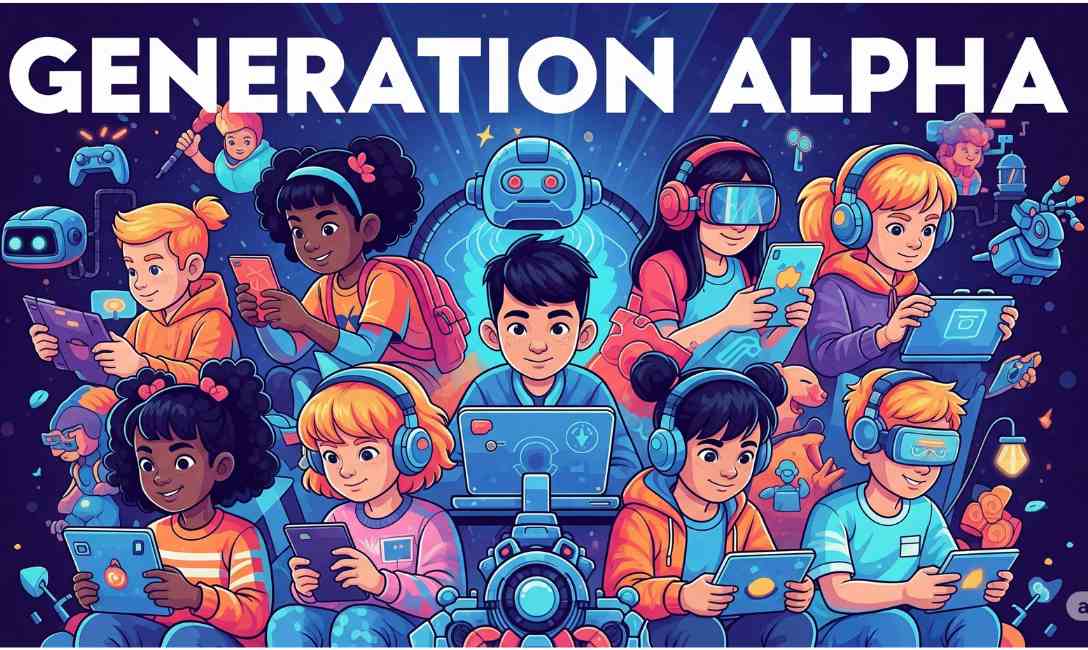Introduction: Who Are Generation Alpha?
Generation Alpha refers to the cohort of individuals born from 2010 onwards, generally projected to last until 2025. As the first generation to be fully raised in the 21st century, these children are growing up with iPads, artificial intelligence, smart homes, and global connectivity. Coined by social researcher Mark McCrindle, the term “Generation Alpha” marks a new beginning — a step into an era that is hyper-digital, hyper-connected, and globally aware.
Why Generation Alpha Matters
Generation Alpha is expected to be the largest, most educated, and wealthiest generation in history. According to McCrindle Research, more than 2.5 million Alphas are born globally each week, and by 2025, there will be over 2 billion members in this generation.
They matter because:
- They will soon influence family purchasing decisions
- They will reshape education systems with digital-first learning
- They will define future work cultures and career landscapes
- They will shape trends in media, tech, and social values
Understanding Generation Alpha is critical for educators, policymakers, brands, and parents alike.
Key Characteristics of Generation Alpha
1. Digital Natives from Birth
Unlike Millennials or Gen Z, Generation Alpha has never known a world without smartphones, AI, or YouTube. They are being raised with:
- Touchscreens instead of keyboards
- AI assistants like Siri or Alexa
- Streaming platforms like Netflix and YouTube Kids
Digital interaction is not new — it’s their native language.
2. Tech-Savvy Learners
With online classrooms, gamified apps, and instant access to knowledge, Generation Alpha is redefining education. They are more likely to:
- Learn through videos, VR, and AR
- Prefer visual and interactive content
- Show advanced tech skills from a young age
3. Socially and Environmentally Conscious
Raised in a world of climate change, diversity movements, and global crises, Generation Alpha tends to:
- Be more aware of environmental sustainability
- Value inclusion and equality
- Engage in causes through digital platforms
They are likely to become activist consumers and citizens.
4. Emotionally Intelligent
With increasing awareness around mental health, today’s parenting and education systems focus more on emotional development. As a result, Generation Alpha is growing up with:
- Mindfulness practices
- Empathy training
- Mental health support
They are expected to be more emotionally aware and open than previous generations.
Generation Alpha vs. Gen Z: What’s the Difference?
| Feature | Gen Z (1997–2009) | Gen Alpha (2010–2025) |
| Tech Exposure | Grew up with tech | Born into tech |
| Education | Online and in-person mix | Primarily digital & interactive |
| Media | YouTube, Instagram | YouTube Kids, TikTok, Metaverse |
| Values | Activism, expression | Sustainability, innovation |
| Devices | Smartphones, tablets | Smart devices, wearables, AI |
The Role of Parents and Educators
For Parents:
- Model digital balance: Alphas learn from their parents’ screen habits.
- Encourage creativity: Use tech to enhance rather than replace imagination.
- Support emotional learning: Help them express and understand emotions.
For Educators:
- Use EdTech tools: Interactive apps, AR/VR, and gamified content engage better.
- Personalized learning: Adaptive learning systems help meet individual needs.
- Promote critical thinking: Help them evaluate digital information.
Generation Alpha and Technology
Technology is inseparable from Generation Alpha’s identity.
Trending Technologies Among Alphas:
- Artificial Intelligence (AI) Tutors
- Augmented Reality in Classrooms
- Voice-activated Learning Assistants
- Smart Toys and Robotics
- Wearables for health tracking
These innovations offer enhanced learning, entertainment, and development, but they also demand ethical guidelines and parental oversight.
Mental Health and Well-being
While technology enhances life, overexposure can impact mental health. Risks include:
- Reduced attention span
- Digital addiction
- Social isolation
Support systems like tech breaks, outdoor activities, and family interactions are crucial. Parents and educators must work to balance screen time and real-time.
Generation Alpha’s Impact on Marketing and Business
Brands must rethink their strategies to appeal to Alpha-influenced households. Even though most Alphas aren’t direct buyers yet, their preferences influence parental purchasing decisions.
What Works:
- Short-form, visual content
- Gamification and interactive campaigns
- Values-driven branding (eco-friendly, inclusive)
- Voice search and AI integration
Companies like Lego, YouTube, and Nike are already designing marketing strategies aimed at Alpha engagement.
The Future of Work for Generation Alpha
Generation Alpha will likely work in jobs that don’t exist yet, in fields driven by:
- AI and Machine Learning
- Space tech and biotech
- Climate science
- Creative and gig economy platforms
They are expected to pursue non-traditional career paths, blending creativity with automation.
Skills they’ll need include:
- Digital literacy
- Critical thinking
- Adaptability
- Emotional intelligence
Challenges Facing Generation Alpha
- Information Overload: With constant access to data, filtering facts from misinformation is a concern.
- Cybersecurity and Privacy: More connected devices mean more vulnerability.
- Digital Divide: Access to technology varies across socio-economic backgrounds.
- Mental Health Risks: Isolation and digital dependency are real threats.
Solutions must come from parents, educators, governments, and tech companies collectively.
Generation Alpha in India and Developing Countries
In countries like India, Generation Alpha is growing up in a unique blend of tradition and innovation. With government initiatives like Digital India and National Education Policy 2020, the future is optimistic.
However, bridging urban-rural tech access, language diversity, and infrastructure gaps remains critical.
Final Thoughts: Preparing for a Generation Alpha World
Generation Alpha is not just another demographic — they are reshaping the world before they even reach adulthood. Their digital fluency, emotional intelligence, and global awareness make them uniquely equipped to thrive — but only if guided thoughtfully.
We must ensure that technology is used to empower, not distract and that values like empathy, responsibility, and curiosity are nurtured alongside coding and content.
Whether you’re a parent, teacher, policymaker, or brand strategist, now is the time to understand Generation Alpha and adapt your world for its future.




